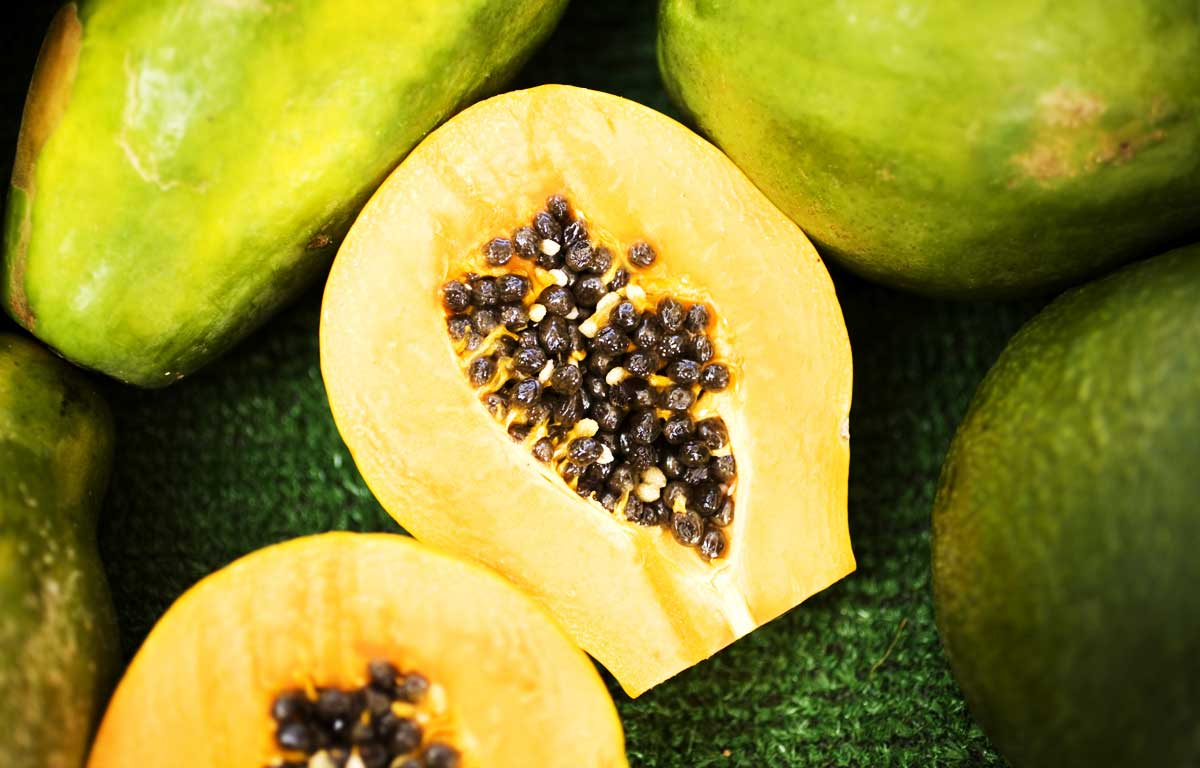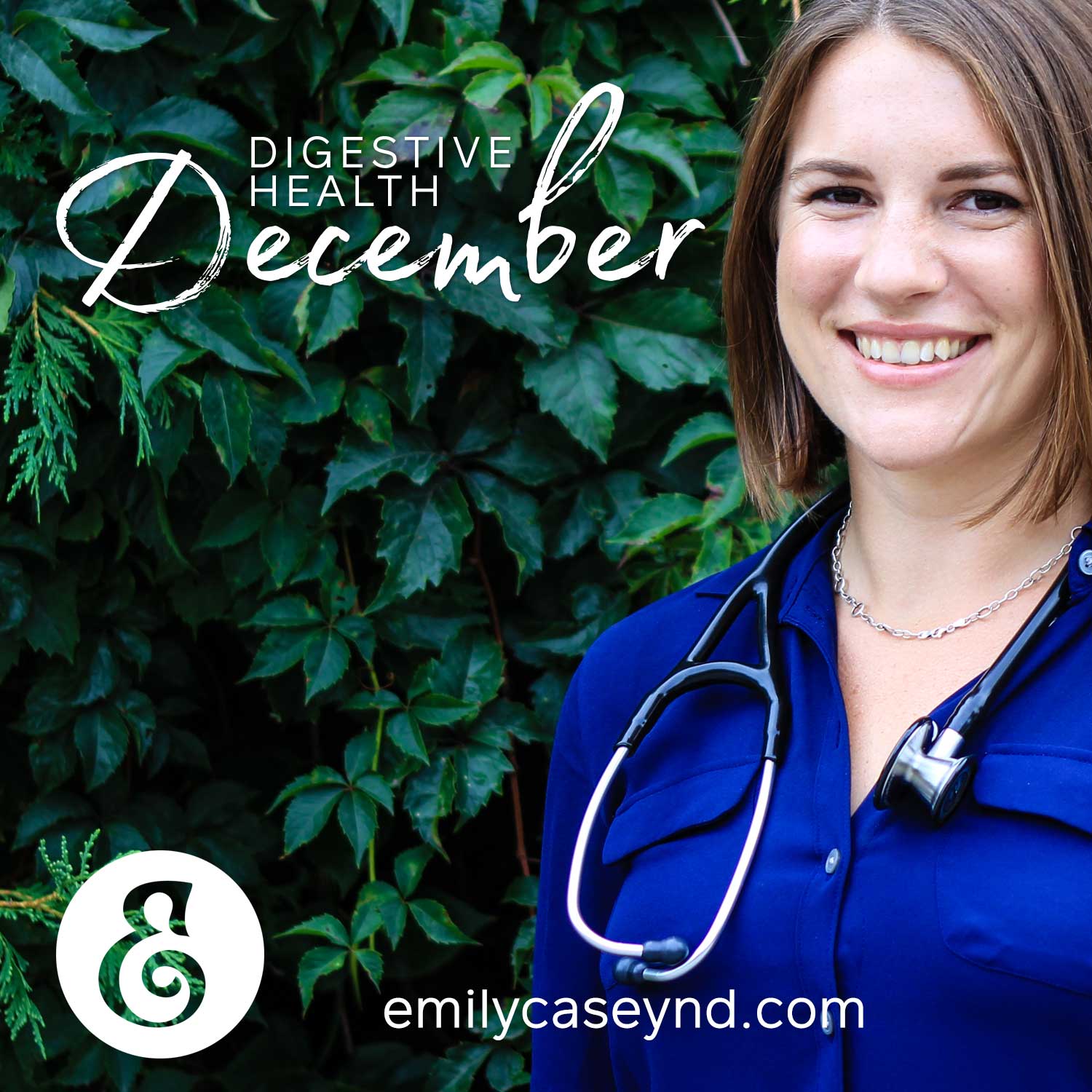01 Dec Digestive Health December
Happy December!! It’s crazy that we are now in the final month of 2017 but lucky for you, I’ve saved the best topic for last! Digestive health. Digestion is the aspect of my own health that has needed the most love and attention over the years and it is the reason I learned about naturopathic medicine and ultimately became a naturopathic doctor. I work with many of my patients to help them overcome their digestive concerns to improve their health and quality of life. I see the positive impact that naturopathic medicine has on the digestive system and it makes me excited to be able to share this information with all of you! This blog post didn’t feel like it would be complete without including a piece of my own story in it! Read on to learn about how my digestive system led me to become a naturopathic doctor. I’ll share some of the lessons I learned throughout my own journey and how I can support you through your own digestive health journey.
My Story
I have always been the person with the sensitive digestive system. It’s my stress alarm button. When I’m overworked, my digestive system tells me to take a break. Throughout my first year at university (a big life change is often a time when health concerns come to the surface), it got much worse and I decided it was time to figure out exactly what was going on. I was spending hours in the bathroom every day, frequently having diarrhea, feeling tired all the time, having stomach pain that kept me up at night, constantly feeling bloated and gassy, and I knew something wasn’t right. My doctor ran the necessary blood work and my celiac antibodies came back borderline positive. My granny had been previously diagnosed with celiac so between the family history and the significant digestive symptoms, it was decided that the borderline positive would be considered positive and I would try a gluten free diet. At that point, I was willing to try anything! I had lived for many years with my granny eating gluten free so I had a good sense of what the diet entailed and felt that I would be able to manage it.

Lesson #1: Digestion is a private topic. It is uncommon for it to be a topic of discussion among friends and family so many people don’t really know whether their symptoms are normal or not. Don’t suffer silently. Don’t be afraid to talk about it with your family or with a healthcare practitioner.
After months on a gluten free diet, I was feeling slightly better but still having most of the same digestive symptoms. I was still uncomfortable and the symptoms I was experiencing were still impacting my ability to sit through an entire class at school, enjoy a night out with my friends, and fully experience so many other areas of my life. I went back to my doctor and she recommended I see a gastroenterologist. I happily obliged and was anxious to hear what he would recommend. He felt strongly that I likely just had irritable bowel syndrome (but really what does that mean….JUST irritable bowel syndrome….we should want to figure out WHY our bowels are irritable…anyway, maybe more on that in a future blog post) but that we should do a small intestine biopsy (via an upper endoscopy procedure) to properly rule out celiac disease.
In hindsight, I should have gone straight for the endoscopy after receiving the borderline positive blood test result. You must be eating gluten to do both the celiac antibodies blood test and the small intestine biopsy. Since I had been eating a gluten free diet for quite a few months already, I had to do a gluten challenge prior to the endoscopy. This means that I had to eat the equivalent of 1 slice of bread daily for 3 months. I actually believe that this gluten challenge helped me commit to my gluten free diet long-term. It showed me that I didn’t feel well when I ate gluten and it also gave me a chance to eat all the things I had missed over the past few months eating gluten free. I ate Tim Horton’s donuts, and Webers burgers, and all sorts of delicious gluten full food!! It was painful but heavenly.

Lesson #2: If you think you might have celiac disease, get tested BEFORE you start eating gluten free. You must be eating gluten for the test results to be accurate. Check out my celiac disease blog post to learn more.
Long story short, I did the endoscopy and the gastroenterologist apologized for thinking it was just irritable bowel syndrome because the biopsy showed that I clearly had celiac disease. I’m grateful that I went through this experience and have the official diagnosis of celiac disease so that I don’t have to spend any time questioning it. However, I wasn’t any better off health-wise than I had been prior to working with the gastroenterologist. He didn’t have any new suggestions except to continue eating a gluten free diet, as that is the only medical treatment for celiac disease. Luckily, I had an amazing family doctor who suggested I try working with a naturopathic doctor!!
Confession: I had never worked with or heard of a naturopathic doctor until this point in my life!
Lesson #3: Don’t be afraid to go against convention and try (safe) alternative options. Naturopathic doctors, homeopaths, psychologists, dietitians/nutritionists, acupuncturists, chiropractors, osteopaths, massage therapists, and so many other types of healthcare practitioners can play an important role in your healing journey!
I did what everybody does to find a naturopath – GOOGLE! I googled naturopathic doctor celiac Toronto and met my incredible naturopathic doctor who has helped me through so much over the past few years! She was able to help me understand why the gluten free diet alone wasn’t enough to heal my digestive system and how we could speed up the process by using natural therapies. She supported me with great recommendations for additional food elimination (I did the low FODMAP diet for approximately 1 year), probiotics, gut healing supplements, gut-friendly fibre options, digestive enzymes and bitters, and so much more. She also connected me with a therapist who helped me work through the anxieties associated with having an unhealthy digestive system. There was frustration, anxiety, setbacks, and tears but there was also slow and steady progress towards a healthier digestive system and living my life without being worried about where I could find the closest bathroom.

Lesson #4: How you eat is just as important as what you eat! Understanding how to manage my anxiety and eat in a slow, relaxed, and digestion-friendly way made a huge difference to me! I thought I was getting “glutened” every time I ate out but I realized that it was more likely an anxiety response.
I still have days when I feel bloated or have diarrhea or stomach pain but they are few and far between and usually have an identifiable cause (stress, accidental gluten exposure, etc). I believe that everybody has an aspect of their health that is generally more susceptible to the effects of stress and life changes and my digestion will likely always be that stress button for me. However, I wouldn’t feel confident helping others overcome their digestive concerns if I didn’t feel that I had overcome mine. I still have celiac disease and I still have to eat gluten free but my digestion doesn’t hold me back from living my life.
Lesson #5: Don’t dismiss self-care. Your mind can easily ignore your body’s signals that you need a break. Don’t let this happen. Learn to listen to those signals and appreciate them.
I wanted to share this story because I think it will help you to know that your naturopathic doctor is a real person too. I have struggled with my health but I have worked through it with the support of my own healthcare team and gotten to the other side. Whether your health concern is related to your digestive system or another aspect of your body, I know that I can relate to what you’re going through and use my knowledge to help you find the support system your body needs to overcome it.
The 4 Rs of Gut Healing
Since the focus of this month’s blog post is digestive health, I want to share with you the framework that I use with my patients when we are working on improving digestive health. I always individualize it to each individual patient but it usually follows these general guidelines of the 4 Rs of Gut Healing.
Remove

Most importantly, we need to figure out the foods that might be causing or aggravating your symptoms and remove them from your diet! Just to be clear, this doesn’t necessarily mean you have to remove them from your diet forever. The best way to determine food sensitivities is to follow an elimination diet. This involves eliminating the most common allergenic foods and then reintroducing each food group slowly and systematically. Monitoring your symptoms during this reintroduction phase is key for figuring out any food sensitivities.
For some people, it can be more effective to follow a low FODMAP diet. It is similar to an elimination diet but with some important differences. It isn’t focused on removing the most allergenic foods but instead it removes the easily fermentable carbohydrates from your diet. This can have significant benefits for improving diarrhea, bloating, gas, and abdominal pain. I strongly believe in working with my patients to figure out an individualized diet that eliminates their most likely triggers but that is also manageable.
Replace

Additional digestive support short-term is often very helpful for improving digestive symptoms. This is especially true for patients with celiac or other malabsorption disorders because the intestines are likely not producing the necessary numbers of digestive enzymes to fully digest your meals. For example, it is very common for newly diagnosed celiac patients to suffer from lactose intolerance because the lactase enzyme is produced in the part of the small intestine that experiences the most damage. This digestive support is also helpful for patients without a gallbladder (or with gallbladder disease) since they aren’t getting that additional bile that is released from the gallbladder to assist in digestion of fats. There are a variety of natural digestive support options so the exact recommendation depends on my patient’s individual symptoms. I will use digestive enzymes, betaine HCL, or herbal bitters with meals to aid digestion.


Reinoculate
Many digestive symptoms are caused or aggravated by an imbalance in the gut microbiome. Adding in a good quality probiotic can have significant benefits. There are a range of different probiotic species so we need to choose the supplement that will be most appropriate for you. Probiotic supplements range from single strain to multi-strain and from a few million strains to hundreds of billions of strains. You can also get probiotics in your diet from fermented foods, such as miso, sauerkraut, kombucha, and kimchee.
Repair
We can use herbal supplements to assist in healing the lining of the esophagus, stomach, and intestine. The cells in the digestive tract are constantly turning over so there is lots of opportunity for healing! For this step, I will most commonly use curcumin, aloe vera, l-glutamine powder, deglycyrrhizinated licorice (DGL), ginger, and/or zinc. There are numerous options and, as the theme of this blog appears to be, the choice is very individualized to the patient’s specific sypmtoms. All digestive syndromes are not created equal! They all require an individualized approach and treatments specifics to your needs.
Digestive Conditions
Digestive conditions that can be treated with naturopathic medicine (alone or in combination with conventional medical therapies):
- Irritable bowel syndrome (IBS)
- Inflammatory bowel disease (Crohn’s disease, Ulcerative Colitis)
- Constipation, diarrhea, bloating
- Gastroesophageal reflux disease (GERD)
- Peptic ulcer disease
- Food intolerances/allergies
- Celiac disease
- Small Intestinal Bacterial Overgrowth
- Gallstones, Cholecystitis
- Hemorrhoids and anal fissures
- Diverticulitis
- Endometriosis (not digestive but it can often look very similar to irritable bowel syndrome!)
There are also non-digestive conditions that can often benefit from gut healing protocols:
- Endometriosis
- Infertility
- Eczema, psoriasis and other skin rashes
- Autoimmune disease
- Migraines
- Anxiety and depression
- Weight issues
- Joint pain or arthritis
2017 Year of Health (AKA Year of Digestive Health!)
Have you had a chance to check out each of my monthly blog posts from this past year? As I’m looking back at them, I’m realizing that every single one can be used to address digestive concerns!
- Jogging January: Move your body daily to aid in digestion.
- Fight the Flu February: Check out this post for my bone broth recipe! Bone broth is great for the immune system, as well as gut healing.
- Mindfulness March: The benefits of mindfulness are numerous, especially for anybody who is managing chronic pain. This post will help you learn why and how to add 10 minutes of mindfulness meditation to your daily life.
- Asparagus, Arugula & April: Adding veggies to your diet is important for overall health. Raw vegetables can be challenging on a sensitive digestive system so consider eating your vegetables cooked until you have healed your gut.
- Celiac Awareness May: This post will help you further understand everything you need to know about diagnosing and managing celiac disease.
- Just for Kids June: Digestive disorders often start in childhood so if you’re worried that your child’s digestive system might need additional support, consider bringing them to a naturopathic doctor!
- Journey into Nature July: Self care is an important part of healing the digestive system and time in nature is a great way to add self care to your day!
- Adrenal Love August: Stress is a common trigger for digestive upset. Learn how to better manage your stress in order to better manage your digestion.
- Sleep Easy September: Sleep is a key aspect of healing. All of our tissues need time to heal, including our digestive tissues, and getting 8 hours of sleep optimizes this healing.
- October Omegas: Many digestive disorders are associated with inflammation. Omega 3 fatty acids are anti-inflammatory and this effect can improve your symptoms.
- Natural Pregnancy Support November: Acid reflux, constipation, nausea, and other digestive concerns often arise for the first time during pregnancy.
- Digestive Health December!

THANK YOU!
I hope this blog post helped you understand how I can support your digestive health and gave you some valuable insight into the importance of individualized support for gut healing protocols.
Thank you to everyone who has been following along with me throughout the 2017 Year of Health! I’ve loved sharing my blogs with you and can’t wait to continue creating content for you to read and learn in 2018!

